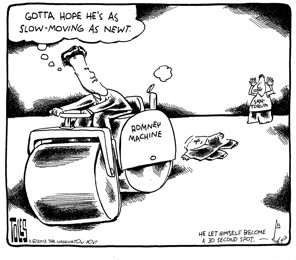With the fall of Hungary’s Western-style, pluralistic democracy, the time is right for the United States to reinstate Radio Free Europe’s
Hungarian-language broadcasts. Hungarian would then join 28 other
languages in which Radio Free Europe (RFE) transmits its programs on
radio stations in countries of the former Soviet Union, the Middle East,
South Asia and the Balkans. The president of one of these countries
told one of us last year that he begins every morning by listening to
RFE’s summary of the news.
While Hungary is a member of both NATO
and the European Union, it is at risk of becoming a constitutional
dictatorship and a pariah in the West. Its hastily adopted new
constitution has no meaningful provisions for checks and balances. All
branches of government and all independent institutions, including the
judiciary, are controlled by Orban and his party for nine years with
automatic renewal for many more similar terms.
Since his election
in 2010, Orban has followed a confrontational, nationalist foreign
policy vis-a-vis the West, which stands in stark contrast to his
approach to the authoritarians in Russia and, especially, China. He
speaks kindly of “eastern winds” while predicting the “decline of the
West.” He deploys statist yet utterly unpredictable economic policies,
precipitating a downgrading of the Hungarian economy to junk status by
all three major credit agencies. Finally, Orban is pursuing a ferocious
cultural war calculated to court the supporters of Jobbik, an anti-Romany, anti-Semitic far-right party.
There are serious reasons for bringing back RFE’s Hungarian broadcasts, which ended in 1993.
●The first is the current demise of Hungarian media freedom, both the root and the finest fruit of all other liberties.
●Second,
one of the lessons of Europe’s last century is that broadcast
monopolies by nationalist governments lead to international tensions and
conflicts. Indeed, Orban’s anti-democratic measures could encourage
politicians in nearby Slovakia and Romania to imitate his combination of
anti-foreign sentiments and denial of free debate on public airwaves.
●Third,
given the similarities in recent Russian and Hungarian attacks on the
United States, Hungary may well be the first ideological outpost of
Putin’s constitutional dictatorship. Supporting the European Union’s
repeated warnings about Hungary’s democracy deficit, Washington should
take steps to counter emerging authoritarianism in Central Europe before
it becomes a trend.
A new Hungarian channel, by making full use
of gifted editors and reporters in Hungary, should become a hub for
quality journalism, a provider of inclusive debates and fair
information, inviting to all and detached from all. By cultivating
rational and civilized debates, it should be a wellspring for democracy
and good journalism. It should not revive the confrontational spirit of
the early years of the Cold War, nor should it even turn into an
opposition channel broadcasting only “bad news” that gets omitted by the
official and semi-official media.
When it seemed that pluralistic
democracy and a free market had taken root in Hungary, Radio Free
Europe appeared to have fulfilled its mission. Now those values are
officially deposed, and a legal system has been built to prevent their
comeback even after the next elections. Restoring the Hungarian service
could be a crucial step in promoting fair and decent values in Hungary,
and in protecting democratic achievements elsewhere in Central and
Eastern Europe.


76
Comments